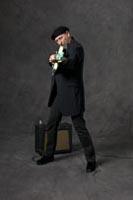Search
Rychard Carrington reports on The Richard Thompson Band - Cambridge Corn Exchange, 19 January 2011

There is so much reverence for Richard Thompson. For decades he has been regarded as the epitome of the artist of quality too good to be appreciated by the mainstream or the trendy. The folk world adores him, even though over his oeuvre as a whole the folk influence in his music has been far from dominant.
Even though not a hint of hype or ego can be detected anywhere near him, it’s tempting to endeavour to puncture the reverence, if only because it gets a little boring in its predictability. There is a sense of ‘here is an artist one ought to hold in great respect. If you don’t actually enjoy his music all that much, best keep that to yourself.’
So what did I really feel? Well, at his 1000 Years Of Popular Music show here two years ago, I was totally won over. What was especially impressive was that Thompson’s acknowledged greatest strengths are as an electric guitarist and as a songwriter, yet in this show he had no electric guitar and didn’t perform any of his own songs. Tonight, though, we were back with a more conventional rock concert format. In truth, I would say I veered between thinking I was witnessing something classy and worthy but not especially exciting or extraordinary, and times when my passion was thoroughly engaged.
Thompson’s personal manner is appealingly modest; slightly nervous yet good-humoured, gently jocular. Of course beneath this a ‘still-waters-run-deep’ inner character is fairly detectable. As a songwriter, Thompson has a reputation as a profound, melancholic introvert. It’s in this department that I sometimes feel disappointed. The spiritual intensity of Calvary Cross and Streets Of Paradise manifests only quite occasionally. In fact, many of his songs are determinedly jaunty, focused on revelries under the ‘bright lights’, or just not especially interesting takes on the age-old theme of love affairs. Yes, Thompson is definitely a good lyricist, but I find Peter Blegvad, Sam Inglis and Neil Innes considerably more witty, poignant and original.
In terms of musical style, at its weakest Thompson’s folk-rock is of the kind that can fall between the stalls of rock power and acoustic beauty: the sort of music that makes you want to shuffle about on your seat a bit, but not quite get up and shake your limbs abandonedly. The contributions of Pete Zorn on brass and woodwind and Joel Zifkin on electric violin sometimes felt like ornate embellishments that never quite came into their own, while Michael Jerome’s drumming sounded too loud and busy in some of the slower numbers.
Such limitations were transcended, however, whenever some instrumental work-out developed from the songs. In particular, of course, when Thompson delivered a solo. Is the appeal of such music mostly confined to the generation born between 1940 and 1960? Great songs are great songs, of course, but something special is attained when rock escapes from a pop song format and explores specifically musical territory in a spirit of loose adventure. Thompson does this extremely well. Indeed, sometimes I wish he’d go further, with longer work-outs akin to those of The Grateful Dead. But this was indeed rock of a heightened nature (with Jerome now coming into his own); rock approximating to the emotional/musical subtleties of the best modern jazz.
The show was performed in two halfs. In the first one the band played tracks from the latest album, Dream Attic, in the same order as on the record. Its quite a typical Thompson album, with perhaps a bit more acoustic input than average, and some welcome trad folk influences. Thompson jokingly apologised for following Demons In Her Dancing Shoes with a couple of polkas, but actally these were among the highlights of the first half – rocked-up trad dance music is usually very enjoyable, and needless to say the Thompson Band perform it well. It was on the murder ballad Sidney Wells and the closing number If Love Whispers Your Name that the instrumental play took off.
The second half featured older numbers. I was thrilled to hear it open with The Angels Took My Racehorse Away, from Thompson's first solo album Henry The Human Fly, which, to my mind, he's never bettered. The rock work-outs kicked off in You Can't Win, reaching the greatest heights in Tear-stained Letter. In between there was a great acoustic number, Al Bowlly's In Heaven, featuring solos by all. This soing about the 1940s reminded me of one of Thompson's true strengths: his genuine interest in both the musical styles and the people of the past. The final encore was a rousing Man In Need. I think the crowd would have preferred 1952 Vincent Black Lightning, but anyway by this time we all knew we were privileged to have witnessed a performance by a bona fide master, albeit an uneven performance. Never mind the reverence, the man is only human.
Writer: Rychard Carrington